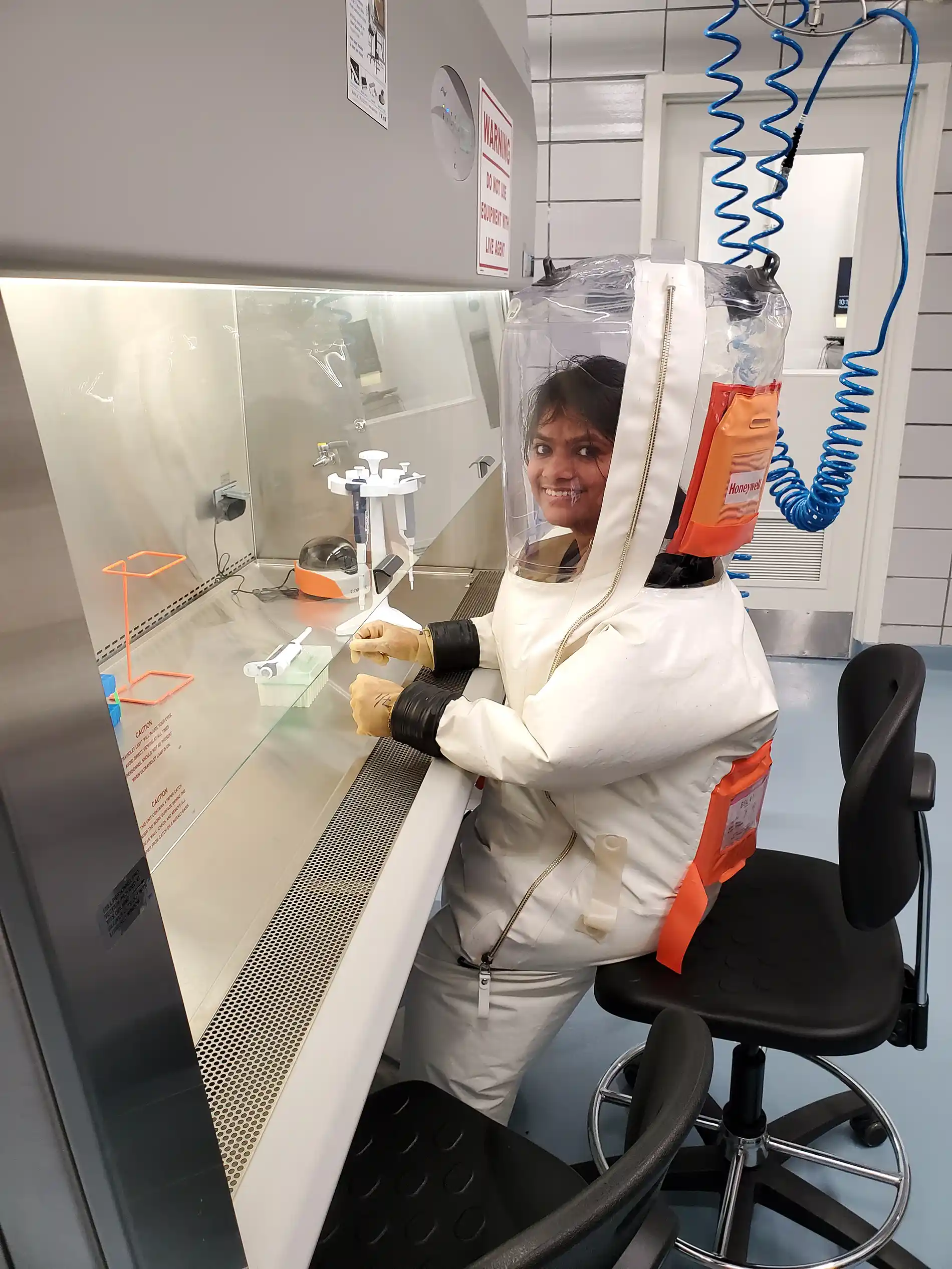Virologist fellow researches antivirals and neutralization assays for deadly viruses
Meet Shilpi Jain
Making a difference often starts small, with the support of family, friends and teachers. For Shilpi Jain her first inspiration was her mother, who had married early and had been unable to pursue a continued education. However, she encouraged Jain to keep learning and helped set her on the path of science, technology, engineering and math (STEM) by making sure that she always had the best opportunities for education. As she studied and grew, Jain discovered her love lay in biology and microbiology.

Shilpi Jain dressed in an air-tight positive pressure suit to protect her from the high-consequence viruses she is studying through her Centers for Disease Control (CDC) fellowship. (Photo Credit: Doctor Melissa Brykailo Pearce (DDID/CDC))
“The more I learned about the subject, the more my passion for it grew,” said Jain. “Throughout my academic pursuits, I was inspired by my teachers, who shared their knowledge and enthusiasm for the subject matter with me. They served as role models and ignited my interest in pursuing a career in STEM.”
She earned her doctoral degree in biochemical engineering and biotechnology from the Indian Institute of Technology-Delhi. After, she began to discover a niche in infectious disease and virology. By studying virology, she could make a difference in peoples’ lives, said Jain, and then she came upon a related followship with the Oak Ridge Institute for Science and Education (ORISE) by chance. She applied to the Centers for Disease Control’s (CDC) Division of High-Consequence Pathogens and Pathology/Viral Special Pathogens Branch (DHCPP/VSPB) program and was accepted as a fellow.
The CDC Research Participation Programs are educational and training programs designed to provide students, recent graduates and university faculty opportunities to participate in project-specific CDC research, current public health research and developmental activities.
Jain joined her mentor, César G. Albariño, studying deadly viruses. Specifically, she researches high-consequence pathogenic viral infections inside a biosafety level 4 (BSL-4) laboratory, meaning the highest level of precautions are required for safe study. For example, Jain and researchers may wear positive-pressure suits, air-tight suits that keep them safe from viral infections which can be transmitted through the air.
She and the CDC are looking at reverse genetic tools for characterization of viruses which subsequently helps in designing vaccines and virus neutralization studies. To do this, she notes the characteristics of the virus, such as how it enters and effects the body. Sometimes this means being in the positive-pressure suit for several hours conducting experiments and paying close attention to safety protocols. She studies a variety of viruses, such as ebola, chapare, machupo and the nipah virus.
Public and global health are some of her utmost concerns. By deepening the scientific community’s understanding of viral infections, Jain hopes to help develop innovative methods and treatments to infections which would otherwise be deadly to their hosts. Some of these methods like Vesicular Stomatitis Virus-based viruses help lower containment facilities do studies on them safely.
“This approach is particularly beneficial for countries with limited access to high-level containment facilities, as it enables them to contribute to the global effort to combat these infections,” explained Jain. “And these findings can lead to the creation of effective therapeutic options, ultimately reducing the impact of these viral infections on global health.”
An additional benefit of improving vaccines for deadly viruses is relieving the economic burden that the increased need for healthcare causes, noted Jain. Ultimately, improving how we fight viruses provides a multifaceted benefit to individuals, society and the planet.
She is assisting with several manuscripts to publish the research and has contributed to journals such as the Morbidity and Mortality Weekly Report and the Journal of Infectious Diseases. Jain will present her findings at the upcoming American Society of Virology Conference.
As a fellow Jain is also learning soft skills and being provided educational resources such as collaborating with her mentor and other interdisciplinary experts. Her mentor, Albariño, is guiding her with his expertise and Jain credits his knowledge as being instrumental in her research.
She recommends the program and says the challenges she has faced in her life and during the COVID-19 pandemic enriched her efforts to grow and learn. She gained invaluable collaborators and friends who supported her through hard times.
“As I reflect upon my ORISE appointment, I am filled with profound gratitude for the unparalleled opportunities and unwavering support I have been afforded throughout my appointment,” said Jain. “I volunteered for multiple CDC COVID response teams, an endeavor that culminated in my contributions as a co-author on numerous publications and the receipt of three prestigious CDC excellence awards.”
After her fellowship ends, Jain has continued plans in virology as an independent researcher. She also aspires to one day take up a mentorship, where she can inspire passionate scientists to continue the important research on high-consequence viruses, just as her own inspirations throughout life have done for her. With the support of her mother, college professors and diverse friends from the lab, Jain’s continued passion for STEM will follow her throughout her research and endeavors.
The program is managed by the Oak Ridge Institute for Science and Education (ORISE) under an agreement between the Centers for Disease Control and Prevention (CDC) and the U.S. Department of Energy (DOE). ORISE focuses on scientific initiatives including educating the next generation of scientists and is managed for DOE by ORAU.

